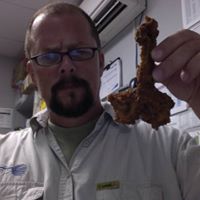Leaderboard
Popular Content
Showing content with the highest reputation on 02/15/2010 in all areas
-
Look for an orginisation with a good culture; one that is open and informal where the employees work together to achieve thier goal. Strong clinical support is a must; a good medical director who is involved and does more than review forms to disclipine people, the supervisors must be more than means to dole out write ups, a structured continuing education program. Does the company get involved in research or offer journal access, do they take part in trials or send people to conferences etc How does the company support continued professional development, who can you talk to if you feel you are having a problem about something of a clinical nature? If you want to go to Paramedic school do they encourage a Degree or just a quicky stop down at the local medic mill? Take a look around thier operation; do thier trucks work, are thier supplies up to date, is thier station falling apart; things like that. It is as much as them being a good fit for you as it is about you being a good fit for them Do not overlook the value of patient transfer. If you are serious about being a MEDICAL professional then you will see the benefit in doing low risk, sub-acute transfer work that gets you reading paperwork and building knowledge as well as the finite primary skills like communication and assessment. You should be taking college anatomy/physiology, pharamcology and pathophysiology; these combined with a transport job will give you a much better insight into WHAT is wrong with your patient, HOW the medication they take affects the body and WHY you treat how you treat. This will get you 1000% more VALUABLE AND RELEVANT experience when it comes to dealing with critical or complex patients than any Paramedic program.3 points
-
I'm 17 senior in high school and plan on attending my local college to take some EMT classes but i eventually want to be a Paramedic....what classes should I start with? I need to figure this out cause i need to sign up for classes soon. Also how much does the schooling cost? Was or is if hard for you to go to school full time and work full time? I'm worried i wont be able to work and take my classes at the same time..2 points
-
Perhaps you could articulate why you want to listen in on the local police, fire, and EMS radio traffic. When you are not at work, what benefits do you think you will gain from this activity? I do not see how it is beneficial to know that an ambulance is going to 2303 K street for a shortness of breath and chest pain when you are not actually at work? You asked if it made sense to buy your own scanner to listen in and people have responded by basically saying no. You are going to have to present a compelling case to sway our opinion. Take care, chbare. EDIT: Redundant post?2 points
-
2 points
-
2 points
-
Yeah, and you'll see those types wearing their little pink paramedic princess poophead shirts out for mojitos with their little girlfriends too ... haha let's cater to the tee-hee-hee badge bunny types!2 points
-
2 points
-
2 points
-
I had heard something about a YEG PRU and yes that would help some. I don't however know much more than "I heard a mention of it". PRU5 is now staffed by Parkland but is in the city quite a bit.2 points
-
2 points
-
2 points
-
2 points
-
I'd be willing to bet next year's wages that at least 80% of the public has no idea what the difference between a paramedic and EMT is. They all still call us 'ambulance drivers' but they sure do like the morphine a truck driver can give them, don't they?? I don't know if it's possible for every person out there to understand everything we can do. There is a lot really, and most people don't care much unless they actually need us for something. And I don't mean the B.S. of late like "I've got a sore throat so I'm gonna call 911". Bite me. As an example, the Vital Heart program. After a STEMI is diagnosed and the 12/15 lead sent to the VHR doc's Palm from our LP, he can tell us to administer lytics right on car then zip off to one of 2 cath labs for some sweet sweet angio. There have been news spots on this program, however it seems that the public quickly forgets about things like this. They forget that is, until they are a participant. So who knows, should we be giving the public a little more credit? Probably not2 points
-
I won’t be happy with just any old standard if it’s to be applied nationally. The only thing that will make me happy is if said national standard meets and exceeds the current NOCPs. Without that it’s a waste of time that will only serve to erode current standards. I haven’t seen anything truly progressive or even well researched thus far from ACoP and that truly concerns me. As Squint has already mentioned the current president is an EMR. WHY SHOULD WE TRUST AN AGENCY THAT HAS CHOSEN SOMEONE WITH A 120 HOUR FIRST AID COURSE TO MAKE DECISIONS WITH REGARD TO PARAMEDICINE THAT HAVE NATIONAL RAMIFICATIONS? I view that as being absolutely insane and I highly doubt anyone can come up with an explanation that will convince me otherwise. I will support other paramedics no matter where they choose to practise provided they are professional in their actions and consistently strive to provide the best care possible. If a paramedic happens to work for a fire service then so be it. No one is likely to ever convince me that paramedic positions should exist within a fire service however. Attempts by the IAFF to take over EMS service have nothing to do with improving EMS. These attempts are part of an initiative to preserve FRS positions that would likely disappear otherwise. Regards1 point
-
1 point
-
1 point
-
1 point
-
1 point
-
Be careful here; ventilation and oxygenation are not the same thing, a patient can be barely breathing but adequately oxygenated or breathing fine and inadequately oxygenated. The two are very different physiologic processess which most ambo's never pick up on. If the patient is inadequately oxygenated then its appropriate to use a bag mask however do so at a slow rate; the good old ambo trick of "more is better" is not going to help you. A cautionary note that there is nothing "magic" about oxygen and it is often given to patients who do not require it or in quantities above what is required. 2-4 litres on a nasal cannula will do for 90% of patients who actually require oxygen. Should the breathing become adequate then stop bagging them, there's no point in continuing to do something they can do themselves Do you SEE any evidence of head or spinal trauma? Although it is wise to state the absense of evidence does not indicate evidence of absense I would use a head tilt, chin lift. Most cardiac arrests are primary arrests which are cardiac in origin, traumatic arrests well, there should be some evidence of trauma. Why are you inserting an NPA if the patient has a gag reflex? History of COPD is most likely a red herring designed to make you withold oxygen. Suction the airway and go from there; my guess is the old boy is going to require a lot of suctioning. I'd put him on a non-rebreather mask and see how that works, it may be entirely appropriate to just use that if he is getting good air exchange.1 point
-
I've thought of yet another consideration. You mentioned some time ago that you may relocate to NYC. I don't know if you still plan to go there, stay in FL, or are open to other regions. When discussing compensation, salary vs cost of living is important. Taking a lower salary with the rationalization that it's an area of lower cost may be a mistake. Let me explain: Let's say that you earn 50k/yr, and your monthly cost of living is 2k. Assuming no disposable income is squandered, that leaves an additional 500/month for investment or even more if you invest in in deferred comp pre tax. This is based on 24 pay periods, the other two would be for clothes, recreation, dining, etc. Your pension benefit at 50% would be 25k/yr for the rest of your life. Now, let's say that you earn 100k/yr, and your monthly cost of living is 4k. You now have an additional 1000 post tax for investing. Your monthly pension benefit will be 50k/yr rather than 25k. You've now doubled your annual pension, and an increased your deferred comp (DC) due to compound interest. How much so? Let's assume a 500/month contribution to your DC, starting with 6k at the end of the first year, and an additional 6k added yearly for the next 29 years, at a realistic yet underwhelming 7%. After the 30 years total, you'd have $603,450. Now do 1000/month, or 12k/yr, for 30 years total as above at the same 7%. You'll have $1,206,900, or double the previous calculation. So, when choosing two regions based on cost of living vs salary, be aware that you'll retire much wealthier, providing the pricier area has a more or less proportional cost of living to salary ratio to the less expensive area. This is where those earning meager salaries in inexpensive areas lose out in the long run. You can always leave the expensive area after retirement and move somewhere both desireable and cheap.1 point
-
Edit: the last post should read that I could retire at 55, or 58 w/DROP. Anyway there are a few more things: Starting salary - if it's unusually high for the area, check if that is a tactic to distract from the inadequacies of the dept. Schedules - are they 24's, 16's 12's, 8's? A 24/48 or other variants will be a 56 hour workweek. Be careful with a 24/48, as they can mandate you to stay for up to an additonal 24 so you're working a 36/36 or 48/24 if vacancies abound. For a busy system, 12's and 16's are more desireable. At Charleston, where I worked a 24/48 (no kellys) if I took a day off, or called in sick, that reduced my OT hours. In a 56 hour week, 16 hours are OT. When I took a day off, those OT hours would convert to straight time. This is unacceptable. What's also unacceptable is being paid on call for the overnights. You're paid for the first 16 of a 24 hour shift, and for the last eight you're only paid for the time you run calls. The employer gets over on you for this. The rig is staffed, but they only pay if a call comes in. Don't work for a place that nickle and dimes you like this. If they're cheap with work hours, they'll fall short in other areas as well, I can assure you. Another major factor is if they change schedules periodically. When I worked for NSLIJ hosp in NYC, they would wipe the slate clean every two years and bid out tours on a seniority basis. CCEMS did it every six months. My employer only does it if you're promoted to a new position. Changing schedules can add travel time, or thwart one's plans for child care, school, side jobs, etc. Uniforms and equipment - do they give you uniforms, boots equipment, etc? If they only give you a couple of shirts and maybe a windbreaker, then they're cheap. They'll also be cheap in other areas as well. Equipment - are their rigs fully stocked? Is their medical equipment state of the art, or do they just supply with the bare minimum to pass a state inspection? Are their rigs kept in good repair with regular maintenance? Or are they falling apart. If an agency doesn't keep their apparatus and equipment well maintained, then where else are they cutting corners? Protocols - progressive evidence based, or stuck in 1984? Is there a full time medical director? Is the director accessible for questions? Continuing Ed and training - How do they provide (do they provide?) continuing ed, new equipment/protocol inservices and alphabet card recerts? On duty, off duty or are you on your own? With NSLIJ, we had inservices and ABC card recerts, but no CME's. CCEMS held monthly all inclusive inservices, for 6 hours each, mandatory, but only for straight time, not OT. My employer sends us to EMSCEP, the EMS Continuing Education Program for eight hours quaterly, at a facility run by PA's, RN's and an RT, with a living room and ambulance mock up with SimMan/SimBaby, for lectures, skills instruction/testing and ABC recerts. We also do monthly in station EMS training with both lectures/powerpoints and skill drills, and also quaterly EMS multi unit drills at the fire rescue academy. Is you ConEd free, or out of pocket? Quality employers care about their employees and getting them to re3cert without any financial insult. Discipline - is it progressive discipline, or does it differ on a case by case basis? It ought to be progressive discipline - a verbal warning, a written warning, another written warning with someone in upper management, and then a meeting with the head of dept which typically results with a termination. Of course, the seriousness of the infraction can land you at step 2,3, or ever 4. Union or non union? You need someone to watch your back, to level the playing field with management. $30-50 bucks a month in dues for an extra 10 to 10 grand in salary plus benefits and protection. I'm sold. Stay away, far far away, from agencies with system status management. It's a way for employers to do the most with the least amount of resources. Translation: you'll be worked to the bone, but not see any additional financial benefit from being more "efficient". For pensions, as mentioned in my previous post, the Carolinas have many single role EMS third service agencies. There's also FDNY EMS, but the working conditions suck. It'll be really fun for the first few years, then you'll burn out. Another word on career advancement - you may want to focus in on hospital based EMS if you want to advance out of EMS. Hospital systems afford that opportunity, as well as fixed schedules, that can be tailored to school. It's good to have that option in case you burn out with EMS. I've outlined what I think are the main considerations, from a career development and economic standpoint, regarding EMS agencies. It's up to you what you'll tolerate in choosing an EMS agency, as it's highly unlikely that you'll find all of these qualities in a single agency. That's a huge reason why I went fire based, to enjoy all the positive qualities in an employer as described above.1 point
-
+1 on Everything kiwimedic said, especially taking A&P and pharm, maybe patho. From an economic and career standpoint, this is my short version of what to look for in applying to an EMS agency: Look into what the benefits are, what is the pension, what is my starting salary and what is the pay progression to top pay? What are the opportunies for promotion in the job? Starting salary - ask them how they determine compensation; experience based, step based, case by case basis? How do they progress to top pay? step based, merit based, favoritism? If not step based is it percentage based? This is a good thing due to the compound interest effect. Any COLA's? Benefits - what medical plans do they have, PPO, HMO, OAP, monthly premiums, any deductibles, percentage of coverage out of pocket limit, prescription coverage, etc. How many sick days, admin days, and holidays? What is the process for requesting leave? Are you actually able to use your days, or do they make it prohibitively difficult to take any days off? What are their policies regarding injury leave and opportunities for light duty? Retirement - defined contribution, as in the 401k or 403b was originally designed for the affluent in the corporate world as an additional tax shelter, nothing more. The thing is, these corporations realized that they could save a bundle by discontinuing their defined benefit programs, pensions and instead offer 401k's. Unless you're young and earning six figures with low overhead, you have absolutely no chance in saving enough to sustain yourself in retirement with a defined contribution plan. Especially someone such as yourself with college age children. You'll be living on an EMT salary for a few years and then a medic salary afterward. Enough to pay the bills, but you'll retire poor. You absolutely, without question, need a pension. When looking for a pension, there are several things to consider; what's the multiplier, required years of service, and also number of years to be fully vested. For example, when I worked at Charleston County EMS they were on the state retirement system. You can retire at 28 years of service or 65 years of age, whichever comes first, provided you're vested with five years of service. The multiplier is 1.8 x years of service x average three highest earning years (or one year, I forget). This works out to about 50% of your salary as a yearly pension benefit, plus 1-2% COLAs. They also have the TERI program, which is similar (maybe the same) as our DROP, more on that later. http://www.retirement.sc.gov/scrs/active/basicinfo/default.htm At my employer, we have a 25 and out with a 2.8 multiplier, or 55 years of age. This works out to be 70%. We can also continue to work afterward, to increase the multiplier up to the point that we get 100% as a yearly benefit. Since I was hired at 32 y/o, I can retire fully vested at 53 years of age, with the multiplier adjusted as if I worked 25 years. We also have the DROP, like the TERI in SC. How this works is that you "retire", but then continue to work for up to three additional years. You continue to earn your salary and benefits, and also receive the full amount of your pension checks in a deferred comp account! It's a great way to save up a few hundred grand at the end of your service years, in addition to your deferred comp. You'll also have a 457, which is the same as a 401k except that the employer won't typically contribute anything, since they're helping fund your pension. Also, what percentage of your salary are you required to contribute to your prnsion? We pay 7%. Anything over 9% is a ripoff. If you were to invest that 9% in a deferred comp instead of the pension fund, and received a generous 10% compounded return, you'd still break even after 7 or 8 years, and then the pension would continue to pay until you expire. So, what looks better, a 401k where you need to contribute money that you probably can't spare, and maybe have some clue as how to invest, or a pension that's guaranteed for life, possibly with a DROP or TERI? Think "ENRON" as an extreme example. Promotional opportunities - Are promotions awarded off of a list, where the scores are based on a written exam and maybe an oral interview; or are promotions subjective, with favoritism as the main selection criteria? And what is the actual opportunities for advancement? Are there admin positions available? Or maybe only dispatch? Hospital based and fire based services generally offer the best opportunities for career advancement.1 point
-
Address:Blumenthal Uniforms & Equipment 3133 Arden Way Sacramento, CA 95825 Phone:916-256-3300 The Yellow Pages and/or Google, may be able to help you better than I can, 2800 miles away.1 point
-
Dear FloridaStudent, a few things I've learned when considering ems agency as I am currently very active in talking to the staff of all the different ones in my surrounding area,california, to concentrate on is finding which agency gets the most calls or even which ones get to do 911 calls because, atleast in my area are all by contract and only one agency,amr to be exact has the 911 contract and almost all the rest which there are multiple do transport and well transport isn't exactly what I want to do all the time, I think you should just talk to employees of your surrounding areas of different agencys and see which suites your personal wants in work envirment and type.1 point
-
I'm not going to insinuate anything here. I'll flat out say that there's very little foundation material in EMT-B training to do anything but crude inferences and rudimentary DDxs unless serious extracurricular education is sought. You can't think critically about pathologies that you don't know exist.1 point
-
Speaking of movies, I recommend lifting any "pr0n in the stations" prohibitions. It does wonders for morale.1 point
-
1 point
-
Eydawn, I recognised a couple of individuals there. CTV news ran the footage of the crash and the efforts afterwards. That wasn't the first crash of that type at that corner. Just the most violent. When I worked there last year a couple of skeleton pilots also wiped out there. If you saw the CTV news footage, there is one wearing a red vest near the beginning of the rescue who was facing the camera and grabbing something. His name is Chrs. At the end as they are showing the back of the amulance, there is a man with his head down beside the back door, on the passenger side. He is a sports doc from Toronto, and an African American truned around to walk away from the ambulance. He is Emmanuelle from the U.S. Coast Guard stationed in Galveston Texas. As far as not being permitted to conduct any ALS there, it is because the union refused to allow BCAS to permit us to do it. They claimed they could not verify the quality of training each medic has, so we were relegated to a BLS and extrication role. BCAS ambulances were on scene and there are several docs also scheduled to work there. I did notice that the patient was intubated though, so I suspect a full ACLS code was conducted using the personnel there. Personally, I didn't mind not being permitted to use my ALS scope while I was there. By the time we had anyone removed from the track we were surrounded by docs anyways...and not just your run of the mill GP, but sports specialists and trauma specialists. Two of them work or have worked for CFL teams. I can think of one of two things that likely happened to cause his death. Either a C1/C2 fracture and cord transection or an aortic rupture. I just feel for most of the guys working there. The medical staff may be accustomed to dealing with death, but there is full time staff who work there as well who have likely seen nothing more than burns or minor trauma and I know some have never dealt with a situation like this one.-1 points
-
I've never really gotten the idea that it's easier to suction with an OPA in, perhaps I need more practice. What I was getting at above was this, that this patient needed oxygenation, right? How do we know that? Because his lips are blue. So if his lips are blue, and this convinces us that he really really needs Os, then what advantage has our pt gained for the time that your partner spent digging out and then applying the SPO2? What information did it give you that you didn't already have simply by looking at your patient? Does your book insist that you apply a pulse ox on all difficulty breathing patients? If so it's very dangerous to be convinced that the machine will tell you more than your assessment... Perhaps I'm trying to make these too difficult, but I've lost track of the basic curriculum long ago, so you'll have to help me out... While you're assembling your suction and your partner is dicking around with the SPO2, couldn't someone simply roll this pt to LLR (Left lateral recumbent) so that some of the drainage would simply drain onto the bedding? That's what I meant by the 'found him in the mall' reference. If he's breathing, slobbery, pukey, I'm just going to roll him LLR and find a fireman to stand by being heroic while they wait for EMS. The point I was trying to make before, and doing so very poorly, was to try and focus your attention back onto your patient. All of your answers are there, every time and always will be. You need the rest of the educational tools of cours, but too often when we get jammed up we turn to our books which often necessitates turning away from our patients... I will try and stay more book focused to the best of my ability in the future however.. Good luck girl... Dwayne-1 points
-
Hmm, am I the only one here who's interested in listening to "da copz" and "da firemenz"? And admits it?-1 points
-
OK the scanner bug is bitin' again ..... what do you all think of the idea of using a scanner radio to listen in on stuff going on around your area? I have several fire stations, cops, sheriffs, a hospital nearby, plus talkative hams and probably locals on CB. I'm wondering, does it make sense to get a scanner radio to listen in on stuff to get an idea of what's going on, what kind of calls, radio procedure, etc? How many of you have scanners?-2 points








